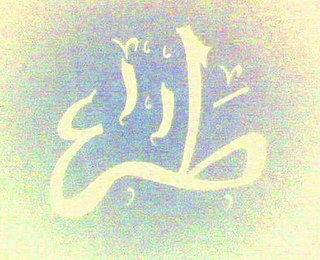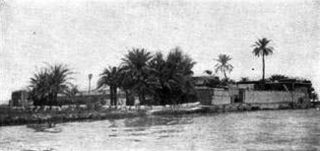Related Research Articles

Abraham was a prophet and messenger of God according to Islam, and an ancestor to the Ishmaelite Arabs and Israelites. Abraham plays a prominent role as an example of faith in Judaism, Christianity, and Islam. According to the Islamic perspective, Abraham fulfilled all the commandments and trials wherein God nurtured him throughout his lifetime. As a result of his unwavering faith in God, Abraham was promised by God to be a leader to all the nations of the world. The Qur'an extols Abraham as a model and exemplar: obedient and not an idolater. In this sense, Abraham has been described as representing "primordial man in universal surrender to the Divine Reality before its fragmentation into religions separated from each other by differences in form". Muslims believe that the Ka'aba in Mecca was built by Abraham and his son Isma'il as the first house of worship on earth. The Islamic holy day, Eid al-Adha, is celebrated partly in commemoration of Abraham's willingness to sacrifice his son on God's command.
Shirk in Islam is a sin often roughly translated as 'idolatry' or 'polytheism', but more accurately meaning 'association [with God]'. It refers to accepting other divinities or powers alongside God as associates. In contrast, Islam teaches that God does not share divine attributes with anyone, as it is disallowed according to the Islamic doctrine of tawhid. The Quran, the central religious text of Islam, states in 4:48 that God will not forgive shirk if one dies without repenting of it.
Yaqub ibn Ishaq ibn Ibrahim ibn Azar, later given the name Israil, is recognized by Muslims as an Islamic prophet. He is held to have preached the same monotheism as his forefathers: Abraham, Ishmael, and Isaac.

Yusuf is a prophet and messenger of God mentioned in the Quran and corresponds to Joseph, a person from the Hebrew and Christian Bible who was said to have lived in Egypt before the New Kingdom. Of Jacob's children, Joseph reportedly had the gift of prophecy through dreams. Although the narratives of other prophets are presented in a number of surahs, Joseph's complete narrative appears in only one: Yusuf. Said to be the most detailed narrative in the Quran, it mentions details that do not appear in its biblical counterpart.

Mūsā ibn ʿImrān is a prominent prophet and messenger of God and is the most frequently mentioned individual in the Quran, with his name being mentioned 136 times and his life being narrated and recounted more than that of any other prophet. He is one of the most important prophets and messengers of Islam.

Haman is the main antagonist in the Book of Esther, who according to the Hebrew Bible was an official in the court of the Persian empire under King Ahasuerus, commonly identified as Xerxes I but traditionally equated with Artaxerxes I or Artaxerxes II. As his epithet Agagite indicates, Haman was a descendant of Agag, the king of the Amalekites. Some commentators interpret this descent to be symbolic, due to his similar personality.
Al-Araf is the 7th chapter (sūrah) of the Qur'an, with 206 verses (āyāt). Regarding the timing and contextual background of the revelation, it is a "Meccan surah", which means it was revealed before the Hijra.
Yunus, is the 10th chapter (surah) of the Quran with 109 verses (ayat). Yunus is named after the prophet Yunus (Jonah). According to tafsir chronology, it is believed to have been revealed before the migration of the Islamic prophet Muhammed and his followers from Mecca to Medina (Hijra), as such, it is known as a Meccan surah.

Ṭā Hā is the 20th chapter (sūrah) of the Qur'an with 135 verses (āyāt). It is named "Ṭā Hā" because the chapter starts with the Arabic ḥurūf muqaṭṭaʿāt: طه (Ṭāhā) which is considered to be one of the names of the Islamic prophet Muhammad.
Ash-Shu‘ara’ is the 26th chapter (sūrah) of the Qurʾan with 227 verses (āyāt). Many of these verses are very short. The chapter is named from the word Ash-Shu'ara in ayat 224. It is also the longest Meccan surah according to the number of verses.
An-Naml is the 27th chapter (sūrah) of the Qur'an with 93 verses (āyāt).

Al-Qasas is the 28th chapter (sūrah) of the Qur'an with 88 verses (āyāt).
Az-Zukhruf is the 43rd chapter (surah), of the Quran, the central religious text of Islam. It contains 89 verses (ayat).
Al-Ḥāqqah is the 69th chapter (sūrah) of the Qur'an with 52 verses (āyāt). There are several English names under which the surah is known. These include “The Inevitable Hour”, “The Indubitable”, “The Inevitable Truth”, and “The Reality”. These titles are derived from alternate translations of al-Ḥāqqa, the word that appears in the first three ayat of the sura, each alluding to the main theme of the sura – the Day of Judgment.

Asiya bint Muzahim was, according to the Qur'an and Islamic tradition, the wife of the Pharaoh of the Exodus.

Maryam bint Imran is revered in Islam. The Qur'an refers to her seventy times and explicitly identifies her as the greatest woman to have ever lived. In the Quran, her story is related in three Meccan surahs and four Medinan surahs. The nineteenth Surah, Maryam, is named after her. Moreover, she is the only woman named in the Quran.
Women in the Quran are important characters and subjects of discussion included in the stories and morals taught in Islam. Most of the women in the Quran are represented as either mothers or wives of leaders or prophets. They retained a certain amount of autonomy from men in some respects; for example, the Quran describes women who converted to Islam before their husbands or women who took an independent oath of allegiance to Muhammad.
The Quran contains references to more than fifty people and events also found in the Bible. While the stories told in each book are generally comparable, there are also some notable differences.

Uzair is a figure who is mentioned in the Quran, Surah at-Tawbah, verse 9:30, which states that he was "revered by the Jews as the son of God". Uzair is most often identified with the biblical Ezra. Historians have described the reference as enigmatic since such views have not been found in Jewish sources. Islamic scholars have interpreted the Quranic reference in different ways, with some claiming that it alluded to a "specific group of Jews".
The Quran states that several prior writings constitute holy books given by God to the prophets and messengers amongst the Children of Israel, in the same way the Quran was revealed to Muhammad. These include the Tawrat, believed by Muslims to have been given by God to the prophets and messengers amongst the Children of Israel, the Zabur revealed to David (Dawud); and the Injil revealed to Jesus (Isa).
References
- ↑ Silverstein, Adam (2008). "Haman's transition from the Jahiliyya to Islam". Jerusalem Studies in Arabic and Islam. 34: 285–308. Retrieved January 11, 2023.
- ↑ Silverstein, Adam J. (2018). Veiling Esther, Unveiling Her Story: The Reception of a Biblical Book in Islamic Lands. Oxford University Press. pp. 39–63. ISBN 978-0198797227.
- ↑ A-Z of Prophets in Islam and Judaism, Wheeler, Haman
- ↑ , Qur'an 28:6, 28:8, 28:38, 29:39, 40:24, 40:36.
- ↑ "Surah Al-Qasas - 1-88".
- ↑ "Quran, Surah 10:92, note: the phrases 'we will save you' (nunajjīka نُنَجِّيكَ) & 'that you may be' (litakūna لِتَكُونَ) are all written (addressed to) in the second person singular, thus grammatically speaking there is one person addressed, namely Pharaoh, as evident in the preceding verses (Surah 10:90-91)".
So today We will save you in body that you may be to those who succeed you a sign. And indeed, many among the people, of Our signs, are heedless.
- ↑ Asad, Muhammad (1980). The Message of the Qur'ān. Gibraltar: Dar al-Andalus. p. 751.
- ↑ S. Mohammad Syed "Historicity of Haman as Mentioned in the Qur'an" (Islamic Quarterly, 1980, Volume XXIV, pp. 48-59)
- ↑ Pharaoh, Haman and Korah in the Quran http://globaltab.net/Articles/ArticleDetail/10123 Archived 2023-02-03 at the Wayback Machine
- ↑ A. H. Jones, "Hāmān", in J. D. McAuliffe (Ed.), Encyclopaedia Of The Qur'an, 2002, Volume II, op. cit., p. 399.